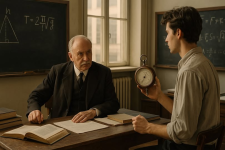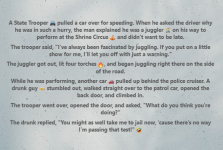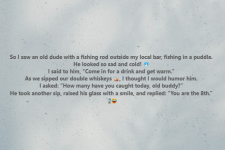Shiftless2
Well-known member
Have to say, I've seen this story before but this is the first time I've seen a student's name attached. Or a professors.

 The Barometer Story: How Niels Bohr Outsmarted an Exam—and Redefined Genius
The Barometer Story: How Niels Bohr Outsmarted an Exam—and Redefined Genius
One day, a professor approached Ernest Rutherford, president of the Royal Academy, with a dilemma. He was about to fail a physics student who had given a completely correct—but entirely unconventional—answer to a test question. The student insisted he deserved top marks. They agreed to let Rutherford act as an impartial judge.
 The Exam Question:
The Exam Question:
"How would you measure the height of a building using a barometer?"
 The Student’s Answer:
The Student’s Answer:
"Tie a long string to the barometer, lower it from the roof to the ground, then pull it back up and measure the length of the string. That’s the height of the building."
Technically? Correct.
But was it physics? The professor said no. So Rutherford challenged the student: “You have six minutes to give another answer—this time using physics.”
Five minutes passed. The student had written nothing. “Are you giving up?” asked Rutherford.
“Not at all,” the student replied. “I’m just choosing the best of the several answers I’ve come up with.”
Intrigued, Rutherford let him speak.
 New Answer:
New Answer:
"Drop the barometer from the roof and measure how long it takes to hit the ground. Use the equation of free fall to calculate the height."
Physics-approved? Yes. The professor gave in. But the student wasn’t done.
He continued:
 "You could measure the height of the barometer and its shadow, then measure the building's shadow. Use proportions to find the height."
"You could measure the height of the barometer and its shadow, then measure the building's shadow. Use proportions to find the height."
 "Or walk up the stairs, marking the wall with the barometer, count the marks, and multiply by its length."
"Or walk up the stairs, marking the wall with the barometer, count the marks, and multiply by its length."
 "Tie a string to the barometer and use it as a pendulum. Compare gravitational differences at the top and bottom to calculate height."
"Tie a string to the barometer and use it as a pendulum. Compare gravitational differences at the top and bottom to calculate height."
 "Or simply offer the building manager a nice barometer in exchange for the height information."
"Or simply offer the building manager a nice barometer in exchange for the height information."
Rutherford, amazed, asked: “Did you know the standard answer?”
“Of course,” the student said. “But I’m tired of teachers insisting there’s only one way to think.”
That student’s name?
Niels Bohr—the Danish physicist who went on to win the Nobel Prize in 1922.
 The Moral?
The Moral?
Real genius doesn’t just follow the rules—it reimagines them.
True education doesn’t punish creativity—it celebrates it.


One day, a professor approached Ernest Rutherford, president of the Royal Academy, with a dilemma. He was about to fail a physics student who had given a completely correct—but entirely unconventional—answer to a test question. The student insisted he deserved top marks. They agreed to let Rutherford act as an impartial judge.

"How would you measure the height of a building using a barometer?"

"Tie a long string to the barometer, lower it from the roof to the ground, then pull it back up and measure the length of the string. That’s the height of the building."
Technically? Correct.
But was it physics? The professor said no. So Rutherford challenged the student: “You have six minutes to give another answer—this time using physics.”
Five minutes passed. The student had written nothing. “Are you giving up?” asked Rutherford.
“Not at all,” the student replied. “I’m just choosing the best of the several answers I’ve come up with.”
Intrigued, Rutherford let him speak.

"Drop the barometer from the roof and measure how long it takes to hit the ground. Use the equation of free fall to calculate the height."
Physics-approved? Yes. The professor gave in. But the student wasn’t done.
He continued:




Rutherford, amazed, asked: “Did you know the standard answer?”
“Of course,” the student said. “But I’m tired of teachers insisting there’s only one way to think.”
That student’s name?
Niels Bohr—the Danish physicist who went on to win the Nobel Prize in 1922.

Real genius doesn’t just follow the rules—it reimagines them.
True education doesn’t punish creativity—it celebrates it.











